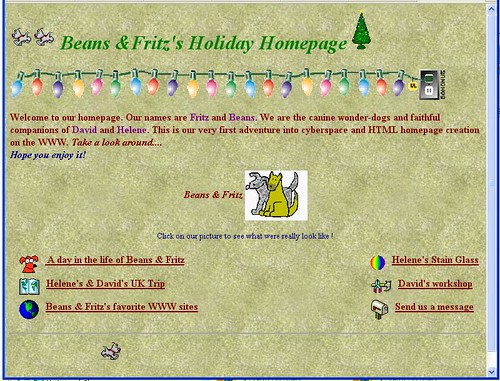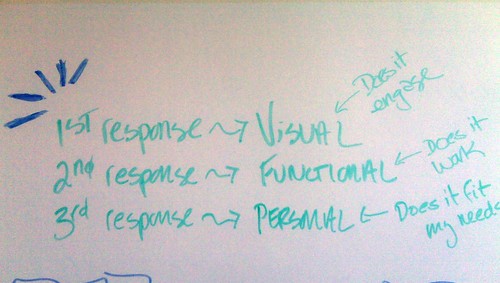Strategies for Digital Natives
View more presentations from hblowers.

 Personally, I have to confess that I dislike the term "Social Media" almost as much as some people dislike "Web 2.0" In my mind, neither of these two terms really communicate the essence of the impact that these new tools and channels enable - which is really nothing more than human conversations and connections enabled across channels of mass impact and scale.
Personally, I have to confess that I dislike the term "Social Media" almost as much as some people dislike "Web 2.0" In my mind, neither of these two terms really communicate the essence of the impact that these new tools and channels enable - which is really nothing more than human conversations and connections enabled across channels of mass impact and scale.

"Every year, Library Journal names a group of innovative librarians as “Movers and Shakers.” M&S is a popular feature for a good reason: the profiles of M&S librarians are thought-provoking and inspiring. M&S ends up as something of a snapshot of what the library profession finds innovative and worth of notice, and there is no question that the Movers and Shakers are people to watch.
But at the Library Society of the World, we can’t help but wonder about everyone else in libraryland. While the Movers and Shakers are moving and shaking, what are the rest of us doing? Standing still? Surely not.
So we have come up with our own award that we see as a complement to M&S. Introducing Library Society of the World’s Shovers and Makers.
And there is only one way to become a Shover and Maker: declare yourself one."
“Social currency is like a good joke. When a bunch of friends sit around and tell jokes, what are they really doing? Entertaining one another? Sure, for a start. But they are also using content -- mostly unoriginal content that they've heard elsewhere -- in order to lubricate a social occasion. And what are most of us doing when we listen to a joke? Trying to memorize it so that we can bring it somewhere else. The joke itself is social currency. "Invite Harry. He tells good jokes. He's the life of the party."
Think of this the next time you curse that onslaught of email jokes cluttering up your inbox. The senders think they've given you a gift, but all they really want is an excuse to interact with you. If the joke is good enough, this means the currency is valuable enough to earn them a response.
That's why the most successful TV shows, web sites, and music recordings are generally the ones that offer the most valuable forms of social currency to their fans. Sometimes, like with mainstream media, the value is its universality. In the US right now, the quiz show "Who Wants to be a Millionaire?" is enjoying tremendous ratings because it gives its viewers something to talk about with one another the next day. It's a form of mass spectacle. And, not coincidentally, what is the object of the game? To demonstrate one's facility with a variety of forms of social currency! Contestants who can answer a long stream of questions about everything from sports and movies to science and history, are rewarded with a million dollars. They are social currency champions.”

When industry norms start to die, people panic. It's difficult to change when you think that you must change everything in order to succeed. Changing everything is too difficult.
Consider for a minute the pivot points available to you:
• Keep the machines in your factory, but change what they make.
• Keep your customers, but change what you sell to them.
• Keep your providers, but change the profit structure.
• Keep your industry but change where the money comes from.
• Keep your staff, but change what you do.
• Keep your mission, but change your scale.
• Keep your products, but change the way you market them.
• Keep your customers, but change how much you sell each one.
… read the full post here.
 It’s Friday, which also means that it’s also the end of Teen Tech Week. In my travels this week, I’ve run across several fun online activities that libraries have created to engage teens with technology online. Here are few that stood out to me.
It’s Friday, which also means that it’s also the end of Teen Tech Week. In my travels this week, I’ve run across several fun online activities that libraries have created to engage teens with technology online. Here are few that stood out to me. It been awhile since I checked in over at the Netvibes account I set up to track CML mentions across the social mediaverse. Today I finally took a quick look. Here' a sampling of just the tweets I found from the last week:
It been awhile since I checked in over at the Netvibes account I set up to track CML mentions across the social mediaverse. Today I finally took a quick look. Here' a sampling of just the tweets I found from the last week:"Did you know Columbus has the number one zoo, library and science center in the nation?" (tweet & tweet)
"@myotive Hrm, no Snow Crash at the Columbus Library on audio book. They have Anathem, though." (tweet)
"@weekendmornings a tour of the orange barrells aka road projects! Lol the columbus library downtown it's got great programs for kids!" (tweet)
"Bella had kids read to her today at the Columbus Public Library - Linden Branch: http://www.flickr.com/photos/mattsidesinger/3337025492/” (tweet)
“i have to hand it to the columbus metropolitan library for fashioning a fine (and warm!) work environment.” (tweet)
“i'm going to my second columbus library in one week! they even let me pick my library card color!” (tweet)
"loves Columbus Metropolitan Library. Rated #1 in the nation. 1 of the reasons living here isn't horrible. columbuslibrary.org Check it out! "(tweet)
2009 LITA/Brett Butler Entrepreneurship Award winner announced
John Blyberg is the 2009 recipient of the LITA/Brett Butler Entrepreneurship Award for his development of the Social OPAC application suite (http://thesocialopac.net), also known as SOPAC (for Social Online Public Access Catalog). SOPAC is a suite of open source software (OSS) tools that brings the power of social computing and Web 2.0 to the library catalog. The current version of SOPAC (2.0) was developed and implemented by Blyberg at the Darien Library in Connecticut. SOPAC has also successfully been implemented on top of Innovative’s Millennium and the Sirsi ILS at other libraries.
“Social Networking has been the global consumer phenomenon of 2008. Two-thirds of the world’s Internet population1 visit a social network or blogging site and the sector now accounts for almost 10% of all internet time. ‘Member Communities’ has overtaken personal Email to become the world’s fourth most popular online sector after search, portals and PC software applications.”
“‘Member Communities’ has taken a foothold in every major market from 50% of the online population in Switzerland and Germany to 80% in Brazil. Facebook has become the largest player on the global stage.”
“A year ago ‘Member Communities’ accounted for one in every 15 online minutes globally – now it accounts for one in every 11.”
"In terms of sheer audience numbers, for example, the greatest growth for Facebook has come from people aged 35-49 years of age (+24.1 million). Furthermore, Facebook has added almost twice as many 50-64 year olds visitors (+13.6 million) than it has added under 18 year old visitors (+7.3 million).”
"Facebook has become the most popular social network in the majority of countries measured by Nielsen Online. It has the greatest reach in the UK, being visited by 47% of Britons online, and actually has a greater online reach in both Italy (44%) and Australia (38%) than it does in its country of origin - the USA (33%)."


“The rise of online social networks, with their troves of data, might shed some light on these matters. So The Economist asked Cameron Marlow, the “in-house sociologist” at Facebook, to crunch some numbers. Dr Marlow found that the average number of “friends” in a Facebook network is 120, consistent with Dr Dunbar’s hypothesis, and that women tend to have somewhat more than men. But the range is large, and some people have networks numbering more than 500, so the hypothesis cannot yet be regarded as proven.”
What also struck Dr Marlow, however, was that the number of people on an individual’s friend list with whom he (or she) frequently interacts is remarkably small and stable. The more “active” or intimate the interaction, the smaller and more stable the group.
Thus an average man—one with 120 friends—generally responds to the postings of only seven of those friends by leaving comments on the posting individual’s photos, status messages or “wall”. An average woman is slightly more sociable, responding to ten. When it comes to two-way communication such as e-mails or chats, the average man interacts with only four people and the average woman with six. Among those Facebook users with 500 friends, these numbers are somewhat higher, but not hugely so. Men leave comments for 17 friends, women for 26. Men communicate with ten, women with 16.”